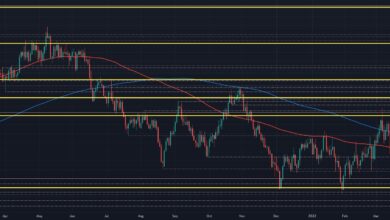Asian stocks got hit hard by worries about the U.S.-China trade war and problems with the Fed.

On Monday, Asian stocks fell sharply. Chinese chipmakers led the way down because of new U.S. trade restrictions, and investors were also worried about the Federal Reserve taking more “hawkish” steps.
The Shanghai Composite index fell 0.4% and the Shanghai Shenzhen CSI 300 index fell 0.9%. Stocks in companies that make chips, like Anji Microelectronics Tech Co Ltd (SS:688019) and Chengdu Xuguang Electronics Co Ltd (SS:600353), dropped as much as 20% after the White House announced export controls that cut Chinese companies off from certain semiconductor chips made with U.S. equipment.
Related: Asian stocks fall as Fed worries come back.
The move also shook the stocks in Hong Kong. The Hang Seng index dropped by almost 3%. Alibaba Group Holding Ltd (HK:9988), Baidu (NASDAQ:BIDU) Inc (HK:9888), and Tencent Holdings Ltd (HK:0700) were all down between 2% and 4%.
The U.S. move could make trade between the two largest economies in the world worse, and if China responds, it could have bigger economic effects.
Data released over the weekend showed that China’s services sector unexpectedly shrank in September because of COVID-related problems. This made people feel worse about China. A recent rise in infections has also made people worried about the need for more lockdowns.
This week, there is also a lot of attention paid to the 20th Congress of the Chinese Communist Party. This is where the government’s plans for the next five years are expected to be laid out.
Broader Asian stock markets fell sharply on Monday, but trading was slow because Japan and South Korea were on holiday.
The S&P/ASX 200 index in Australia went down by 1.4%. The miners lost a lot of money because China’s demand for their products might go down. With a 1.1% drop, the Philippines’ PSEi Composite Index did the worst out of all of Southeast Asia.
The Nifty 50 index of India’s top 50 companies fell 1.3%.
Regional stocks didn’t do as well as Wall Street, which dropped on Friday after U.S. jobs data that was better than expected gave the Federal Reserve no reason to change its “hawkish” tone.
This week, the U.S. CPI inflation data for September, which is due on Thursday, is also a big deal. The reading, which is likely to show that inflation stayed high through December, will also affect how the Fed decides to set interest rates.
Related: Asian stocks go up, and oil keeps going up after the OPEC+ deal.
The markets think there is a more than 80% chance that the central bank will raise interest rates in November by 75 basis points. The biggest problem for Asian markets this year has been rising U.S. interest rates, which are likely to keep markets down for the short term.





